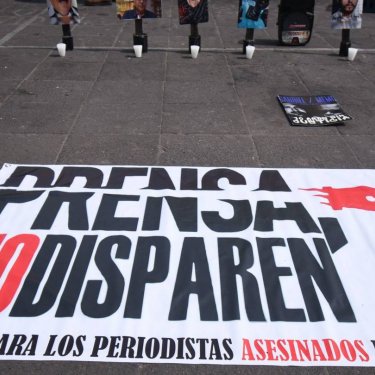Three more journalists murdered in less than a week in Mexico

Reporters Without Borders (RSF) is appalled by the murders of three more reporters in less than a week in Mexico, which – subject to confirmation by RSF’s investigations – will bring the total number of Mexican journalists killed in connection with their work since the start of the year to 11.
The latest victims include two women journalists – Yesenia Mollinedo, the founder and editor of the Facebook news outlet El Veraz, and Sheila Johana García, a video reporter for El Veraz – who were gunned down in broad daylight in Cosoleacaque, in the eastern state of Veracruz, at around 3 p.m. on 9 May.
They were sitting in their car, parked outside a supermarket, when gunmen approached on a motorcycle, riddled the car with bullets and then made off. Mollinedo died on the spot, while García died in hospital a few hours later. Both were wearing identifiable press vests.
Mollinedo’s older brother, Ramiro Mollinedo, who is also a journalist, told the Corriente Alterna website that, two weeks before the shooting, his sister received anonymous phone calls warning her not to cover crime stories. El Veraz covered local news, including crime and politics as well as cultural events organised by the Cosoleacaque town hall. García joined El Veraz six months ago.
The Veracruz state prosecutor’s office announced that it is investigating this double murder but did not say if it has identified a motive. RSF, for its part, has not as yet established a direct link between the double murder and the victims’ journalistic work, but is continuing to investigate the case.
Four days before this shooting, the body of veteran journalist Luis Enrique Ramírez was found wrapped in plastic beside a road south of Culiacán, the capital of the northwestern state of Sinaloa, on 5 May – a few days after his family reported him missing.
Founder of the Fuentes Fidedignas news site and a columnist for the newspaper El Debate, Ramírez had been a journalist for 40 years and was well known in Sinaloa. His last column was published on 3 May, World Press Freedom Day. In the past, he had worked for the national newspapers El Financiero, El Nacional, Milenio and La Jornada.
Colleagues said he had not reported any recent threats and that, because of his extensive experience, he was well aware of the risks associated with journalism, was very cautious and had decided to stop covering crime and the cartels, which are especially violent and powerful in Sinaloa. In 2011, he said he feared for his life because of his coverage of local politics.
“How many journalists will have to be murdered and how many families will have to be destroyed before the Mexican government finally prioritises protecting journalists and combatting impunity for these murders? asked Emmanuel Colombié, the director of RSF’s Latin America bureau. President Andrés Manuel López Obrador must be held to his ‘zero impunity’ commitment for these three new cases as well as the 32 other journalists killed since he became president, added Emmanuel Colombié. The federal authorities and those in Sinaloa and Veracruz must identify all those responsible for these latest cowardly murders without delay and, in their investigations, must prioritise the hypothesis of a link to the victims’ work.”
Depending on the outcome of RSF’s investigations, Ramírez, Mollinedo and García will be the 9th, 10th and 11th journalists to be murdered in connection with their work since the start of the year in Mexico, following José Luis Gamboa, Margarito Martínez, Lourdes Maldonado, Roberto Toledo, Heber López, Jorge Luis Camero, Juan Carlos Muñiz and Armando Linares – a record total.
In partnership with Free Press Unlimited and the Committee to Protect Journalists (CPJ), RSF coordinated a hearing on Mexico – held in Mexico City on 26-27 April – that was part of the People's Tribunal on Murders of Journalists. Designed to hold states accountable for violations of international law, heighten public awareness and provide evidence, these hearings are also intended to empower victims and record their stories.
The case of Miguel Ángel López Velasco, a journalist also known as Milo Vela who was murdered in Veracruz in 2022, was chosen for the hearing. Together with the Mexican singer and composer Vivir Quintana, RSF used the occasion to launch a campaign to pay tribute to Milo Vela and all the other journalists murdered in Veracruz, one of the world’s most dangerous places for the media.
On 22 February, RSF’s Latin America bureau published the findings of a lengthy investigation and analysis of protective mechanisms for journalists in Latin America’s four most dangerous countries for the media – Mexico, Honduras, Colombia and Brazil. It contains detailed recommendations for Mexico’s Federal Mechanism for Protecting Journalists.
